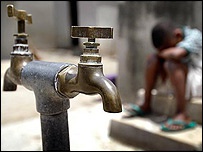Regional News of Friday, 30 November 2012
Source: GNA
Prang water project expected to be completed by December 2013

The two million Ghana Cedis water project for Prang in the Pru District of Brong-Ahafo Region is expected to be completed by December 2013.
Dr Paul Kwaku Tabiri, Development Consultant responsible for the project, disclosed this to the Ghana News Agency (GNA) in a telephone interview on Friday.
He said the project was being financed by the International Development Agency (IDA), a subsidiary of the World Bank (WB).
Dr Tabiri who is also Chief Executive Officer of Tabcon Limited, a Development Consulting Firm in Accra, said Tabcon was executing the project in collaboration with the Brong-Ahafo Regional Office of Community Water and Sanitation Agency (CWSA) and waiting for the contract approval from the WB.
He said documentation including designs and data collection on the proposed mechanised pipe-borne water project would be completed within six months while actual construction work was expected to begin in May/June 2013 and would be completed within six months by December 2013 for the people of Prang to access potable water.
Dr Tabiri explained that the project was designed to extend connections to individual homes as well as public stand pipes for accessibility by families who could not afford private connections.
Nana Kwadwo Nyarko III, Paramount Chief of Prang Traditional Area told the GNA that President John Dramani Mahama had given firm assurance that the water project would be undertaken as scheduled.
President Mahama gave the assurance during his recent campaign tour of the Brong-Ahafo Region, and also promised that the Prang Health Centre would be upgraded into a polyclinic before elevation to a hospital.
Nana Nyarko said Prang, a district capital during the colonial era, depended on the Pru River for pipe-borne water, and their water problems begun when the Volta Lake was expanded and destroyed the machines that provided water to the town.
He said efforts to rehabilitate the equipment during the Second Republic were stalled in January 1972, and the people had to depend on untreated water from the river for domestic and commercial purposes.










